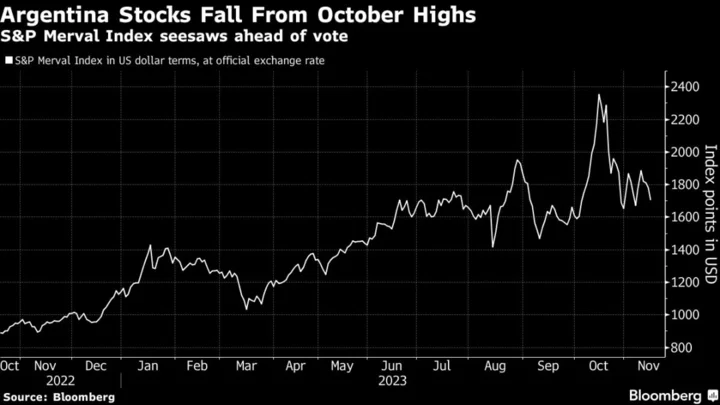Investors in Argentina’s beleaguered financial markets are taking a stoic approach as the nation chooses its next president, bracing for more losses no matter the outcome.
Polls ahead of the Sunday runoff vote signal a tight race between Economy Minister Sergio Massa or libertarian outsider Javier Milei — candidates who have wildly different proposals for the country, with the latter pledging to scrap the country’s currency and replace it with dollars.
Investors aren’t hopeful the election will spark a rally in assets of the serial defaulter, whose bonds have been trading deep in distress after the country last reneged on its debt in 2020. That’s because no matter who wins, Argentina is a tough turnaround story. The country is on the brink of its sixth recession in a decade, the central bank is devoid of dollars and Argentines are suffering under the weight of inflation running at 143%.
“Regardless of who wins, there will be no new money for Argentina from anyone,” said Alberto Bernal, a chief strategist at XP Investments. “Argentina will either have to cut spending drastically and deliver zero deficit, or hyperinflation will do the job that politicians are not willing to do.”
Local markets will be closed on the Monday following the election for a holiday, with trading resuming on Tuesday. Here are key assets to watch ahead of the vote:
Sovereign Bonds
Argentina’s sovereign bonds, for the most part, trade below 30 cents on the dollar, with yields that suggest traders are preparing for the nation’s 10th default. The notes slumped after both the primary, in which Milei led, and the first round of voting, which favored Massa.
“A Milei win will be supportive of bond prices in the short term because of his determination to tackle fiscal imbalances,” said Lucila Bonilla, an emerging markets economist at Oxford Economics. “Massa, on the other hand, largely represents continuity and markets won’t like that.”
Here are some of the most liquid Argentine sovereign bonds:
- Argentina 2030
- Argentina 2035
- Argentina 2046
Corporate Bonds
While Argentina’s economic malaise and political uncertainty have crept into corporate credit markets, bonds from some of the country’s companies have largely been able to hold up amid plunging prices for sovereign debt.
State-owned power company YPF SA’s bonds due in 2025, for example, have soared more than 10 cents from an early-October low to about 93 cents on the dollar.
Ray Zucaro, chief investment officer of RVX Asset Management, said he favors the debt of larger companies with household names and deep-pocketed shareholders. Those firms, he said, are less likely to see volatility after the runoff vote.
- YPF 2025
- Pampa Energia 2026
- MSU Energy 2025
- Genneia 2027
- Aeropuertos Argentina 2031
- IRSA 2028
Provincial Bonds
Debt from Argentina’s regional governments look like bright spots — especially secured bonds from Neuquen and Chubut and notes from Buenos Aires and Santa Fe provinces.
The securities have become something of a bondholder haven for those who want to invest in the country, but avoid the outright risk of sovereign debt.
- Buenos Aires 2037
- Provincia de Cordoba 2025
- Provincia de Neuquen 2030
- Buenos Aires 2027
The Peso
Argentina has restricted the peso’s daily decline for years through currency controls and import restrictions, driving a large gap between its official and parallel rates.
On official channels, one dollar is worth around 354 pesos, while it goes for 851 using the so-called blue-chip swap rate — the most commonly used among market watchers, which is derived from buying securities like stocks or bonds locally, and then selling them abroad. The blue-chip is an approximation rather than a clear benchmark, but represents the market’s true value of the peso against the US dollar.
The gap, which surged ahead of the first-round of the elections as Argentines braced for a long-delayed devaluation following the vote, has shrunk since. This week, the government instituted a so-called crawling peg, devaluing the peso by 1% on Wednesday and a further 2% distributed during the rest of November.
- Blue-chip swap
- Official rate
Equities
Few, if any, foreign investors will look to Argentina’s local stock market due to the currency controls that still heavily restrict access. But the S&P Merval Index will still be closely watched as a gauge for how local investors are reacting to the election.
The index has fallen from its mid-October highs after Massa made a surprise comeback in the October vote. The $55 million Global X MSCI Argentina ETF will also be watched as a gauge of investor sentiment.
- YPF
- Pampa Energia
- MercadoLibre
- Globant
- Arcos Dorados Holdings
- Grupo Financiero Galicia
- Banco Macro
- Cresud SAICIF
Crypto
Cryptocurrencies offer another way for Argentines to skirt capital controls. The online crypto market, which continues trading on the weekend, may give early signals of how markets will react to the results of Sunday’s vote.
--With assistance from Scott Squires.

